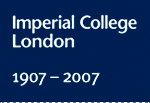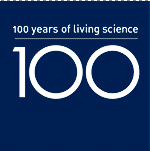Tony Brewis
(Mining, 1949-52 and Mineral Technology, 1960-61)
To Cornwall or bust...
We said it would get us to Cornwall, and it did, just....
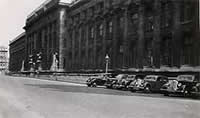 We were now in the final year of the Mining course at the Royal School of Mines. Each year of the course was divided into two half-sessions and the last half-session of all was devoted almost entirely to Mine Surveying. In that year, 1952, it began on the fourth of February. The course itself was divided into three main parts: five weeks intensive lectures, eight weeks practical work at an old disused copper mine in Cornwall, and six weeks in which the maps of the mine were to be drawn. Photo above: The Royal School of Mines
building, 1952.
We were now in the final year of the Mining course at the Royal School of Mines. Each year of the course was divided into two half-sessions and the last half-session of all was devoted almost entirely to Mine Surveying. In that year, 1952, it began on the fourth of February. The course itself was divided into three main parts: five weeks intensive lectures, eight weeks practical work at an old disused copper mine in Cornwall, and six weeks in which the maps of the mine were to be drawn. Photo above: The Royal School of Mines
building, 1952.
Some twenty-eight students, miners and geologists, were going down to Cornwall that year, and as usual they were grouped into fours for the practical work. Each group would work as a team to do the entire surface and underground survey. As most of the calculations had to be done in the evenings, the teams normally arranged to stay together in the same hotel, boarding-house or rented cottage, as the case might be.
The mine we went to, Tywarnhaile, is at Porthtowan, which lies on the north coast of Cornwall between St. Ives and St. Agnes, about four miles north of Redruth. The bus service from Porthtowan to Redruth was not very frequent and did not run very late in the evenings - on a weekday the last bus from Redruth was at 7.20 p.m., although on a Saturdays there was an extra one at 10.00 p.m. Even so, these were not late enough if you wanted to spend an evening in the pub or go to the cinema. In view of this it had become the custom over the years for the various final year groups to 'invest' in some form of automobile transport. Besides taking them down to Cornwall, this could then be used for travelling around the county.
I joined a syndicate of four, the others being Johnny Birch, Brian Collinson ('Collin') and my friend of the trip to Sweden, Kelvin Baird. Johnny had completed his two years' National Service, as an electrician in the R.A.F., before coming to university, but the rest of us had come straight from school. I wrote to an address in Porthtowan, a small (licensed!) hotel, and booked us in for eight weeks.
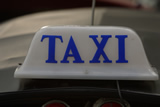 We bought various trade magazines and began our hunt for a suitable vehicle. Received wisdom was that the ideal vehicle was an old London taxi - you could rely on them mechanically - and this is what we had in mind. We saw one advertised for £120, but we hoped to find one for about £80.
We bought various trade magazines and began our hunt for a suitable vehicle. Received wisdom was that the ideal vehicle was an old London taxi - you could rely on them mechanically - and this is what we had in mind. We saw one advertised for £120, but we hoped to find one for about £80.
There was no avoiding Colonel Sheppard's survey lectures. They began every weekday morning at 1000 hours on the dot and each of them lasted precisely 60 minutes. Rather than leaving you to make your own notes, as every other professor or lecturer did, the Colonel would first discuss the subject freely, then write on the blackboard exactly what you had to enter in your notebook. This system worked well - in later years I found the notes on surveying outlasted in their usefulness all my frantic scribblings on any other subject. After the completion of the Colonel's lecture, the requirement then was that we should all proceed in good order directly to the drawing office, to undertake whatever was the current drawing assignment.
To cope with this demand on our time, our syndicate drew up a rota - if we needed to go out to look at a car, one of us would go to the drawing office while the other three took time out. One day we thought our luck was in and three of us hurried off to a garage to see the taxi advertised. On arrival we were told we were too late, although it was not yet noon and the magazine had only come out that day.
"Texi?", queried the man, " No, sorry gents, 'sgorn! 'Bout half-past nine. Tell yer wot, though," he continued, trying to be helpful, "we've got several cars 'ere wot might suit yer, if yer'd care to look".
So we had a look, first at a small car that would never take four of us plus our luggage, and then, after we had pointed out the purpose for which we wanted the car, at their "best bargain". This was an ancient Hotchkiss, an enormous black thing, with a sheet-metal box on the back to form a boot. The first thing that struck our inexperienced selves was that the four doors had one handle between them. We were hesitant about the price, £95, but agreed that, if the car was all right, we might take it.
We asked for a trial run and the man readily agreed. We should have no doubts as to its mechanical efficiency, he assured us, as he had been to Bath and back in it only that week. Passing the door-handle round to whoever needed it, the three of us got into the car one by one, while the owner got into the driving seat. He tried the self-starter, but it didn't work, so he got out and cranked the engine into life. He got in again, depressed the clutch, selected a gear, and let out the clutch. The car didn't move. The vendor explained that it was a special type of hydraulic clutch and the oil sometimes settled on the bottom, causing it to slip until, after a few revs of the engine, the oil got distributed properly. This sounded a bit odd, but we were convinced when suddenly the car leapt forward and we were off.
The driver sped up the mews and out into one of the London squares, which we proceeded to circumnavigate. He took the second corner rather fast and, when he swerved to correct his oversteer and avoid ramming another car, the driver's door flew open. There was no handle on the inside, so he grabbed at the half-open window to pull the door shut. As the door slammed closed, the glass broke in the man's hand and cut him. He swore a string of oaths and drove back to his garage even more quickly. On arrival we dismounted rapidly and, without any need to confer, unanimously assured him there was no way we would buy the car.
Back at College we attended the necessary lectures, while the compulsory drawing exercises were completed in a rush and earned correspondingly low marks. However, the top priority was a vehicle. Two days later, a taxi was advertised for £80, just what we were looking for. So we set off in haste to the address in North Kensington.
When we got there, the taxi had of course gone - we began to wonder if there ever were any taxis, or if they were just put in the adverts as bait. The two brothers who ran the business showed us a decrepit looking Austin which didn't even go and we were about to give up when one turned to the other and said:
"'Ere, Fred, wot abaht that van wot I runs the errands in? Shall we let them 'ave that?"
"Yus, Alf," said Fred, "I fink we could let it go."
"O.K.," said Alf, turning to us," Wot jer fink of this, then, gents? Forty quid, and a snip at the price! Smashing nick it's in, and just wot yer want!"
He led us into the yard and showed us the vehicle. It was a type of van, with large black bonnet and cab, a wooden back painted pale blue, with a canvas roof to it. The back was wide open, there being no rear doors. The floor and sides were made of fairly strong-looking timber. In the midst of his sales pitch Alf said something about it being 'worth forty quid for firewood', but we missed the point of his remark at the time.
We thought the van might be just what we were looking for and began to look it over in our inexpert way. Fred fetched a battery from the house and demonstrated that the lighting worked. The horn, Alf pointed out, was missing, but one could easily be fitted. Then Kelvin saw that the water hose leading to the bottom of the radiator was severed. This, said Fred, was because he had come out the previous night to drain it, as there was a frost about, and had not been able to find the tap in the dark.
Undismayed by the fact that there was no cooling system in operation, they volunteered to drive one of us round the block. Alf was sorry he couldn't take us any further, but he had already had his ration of trouble with the police recently - we gathered he came up before the local magistrate about once a month. Kelvin was chosen to go for the test drive. He and Johnny were the two of us who had full driving licences, while Collin had a provisional one and I was yet to learn to drive.
At the end of the run the van came back round the block and came towards the rest of us as we waited on the pavement. When the driver applied the brakes - which brought the van to a halt in about ten yards or so - I noticed that the front wheels locked solid, unlike the rear wheels. The front tyres had several flat patches on them, apparently caused by this. The effect had been so obvious to me that I didn't think to mention it to the others but it later transpired that no-one else had noticed it.
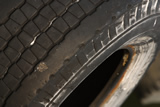 We asked Kelvin what the ride had been like. He said that all had gone well from the moment of starting ( by self-starter, first go ) to the moment of stopping, except for a 'clunking' in third gear which he couldn't explain, but didn't think too important. We asked Fred if the price of forty pounds would include the battery, a spare wheel and the log book. He agreed to find a tyre for the spare wheel, which was in the cellar, and would give us the battery. He kindly pointed out that the van was neither licensed nor insured.
We asked Kelvin what the ride had been like. He said that all had gone well from the moment of starting ( by self-starter, first go ) to the moment of stopping, except for a 'clunking' in third gear which he couldn't explain, but didn't think too important. We asked Fred if the price of forty pounds would include the battery, a spare wheel and the log book. He agreed to find a tyre for the spare wheel, which was in the cellar, and would give us the battery. He kindly pointed out that the van was neither licensed nor insured.
We withdrew to a nearby tea-shop to discuss the deal and decided we should buy the van provided (what a provision!) that the water-hose was replaced. We told the brothers of our decision and arranged to come to collect the van two days later, a Saturday.
When we got there on the Saturday, we found the brothers had made arrangements to tow the van for us. Our first thought was that they had stripped out the engine but they explained that it would be better to tow it from the legal point of view, it not being insured. So Kelvin went in their lorry with Alf, to give him directions, while Johnny rode in the van's cab with Fred, while Collin and I rode in the back. On the way from North to South Kensington, the two of us in the back wondered idly at the cause of some regular 'clunks' from somewhere under the floor boards. However, they were not very loud, so we thought they couldn't be very important.
The van was towed into an open space which lay between the back of the City and Guilds College on Exhibition Road and the India Museum of the adjacent Imperial Institute. As soon as the tow rope was untied the brothers asked for the forty quid. Kelvin jumped in the van quickly to check it would still start, which it did, and Johnny asked for the log book. Fred took out the book and held his hand out for the money, while Johnny took out the money and held his hand out for the book. Neither was willing to give before he received, and they eyed each other in stony silence for half a minute or so before, in a flash, the exchange was made.
The brothers then made for their lorry. Before driving off, Alf said if we needed a good bloke for insurance, they had a pal called Issy Schullmann who would be only too pleased to help, and gave us his address. We decided it would be best not to use him.
Left to ourselves, we inspected our purchase. There was an opening like a small window through from the back to the cab, intended to let the driver use the rear-view mirror - there were no such things as wing mirrors. Some items that needed doing were immediately obvious, such as the lack of windows in the cab - there was a windscreen, but no glass in either door.
The area on which the van was parked was locked at the weekends after lunch-time on Saturday, so we could not make a full start on repairs until after lectures on Monday. After running up the engine several times in an effort to tune it, it became clear we were running the battery flat. We decided the dynamo could not be charging it, so Johnny, our ex-R.A.F. electrician, decided to take it out to inspect it more closely. He shared digs with a fellow who had rewired dynamos for the Navy and had offered to help, so Johnny took it home to have it done. Meanwhile, we had the battery recharged in the College workshops. Kelvin undertook to oversee the mechanical side of things, with me to assist him. I also had the job of fitting windows and handles to the cab doors. Collin was asked to make some kind of tail-board to stop things sliding out of the back of the van, and if possible to get some waterproofing dope for the canvas roof.
On close inspection Johnny found there was nothing wrong with the dynamo and, when he came to check, discovered that the trouble had been that it wasn't wired in correctly. In fact, there seemed to be the remains of three different wiring circuits so, in the end, he pulled out all the wiring and made up his own circuit. He bought a horn for £2 and had a look at the windscreen wiper to see if it could be made to work, which he managed after a fashion.
Now that the dynamo was replaced and the battery recharged, we tried once again to tune the engine. To save the battery as much as possible, we used the starting-handle instead of the self-starter. The main drawback to this was that the starting handle was a home-made device made of a soft iron tube. The three teeth cut in the end of it quickly burred over whenever it was used, so we bought a file and had to resharpen it frequently.
Besides doing the electrical work, Johnny was also looking after the taxing and insurance. The log-book showed the van to have started life in 1933 as a 20 horsepower Standard saloon. The explanation of how it became a van came to light when we noticed the word 'AMBULANCE' beneath the present coat of paint on the front of the van body where it stuck up higher than the cab. Obviously it had been a war-time conversion, to help out in the Blitz. This explained why, to get at the petrol filler cap, you had to take up a loose piece of floorboard in the back of the van.
In view of its age, the van needed an engineer's report before it could be insured. So, as soon as Johnny had put the finishing touches to his wiring, we took it round to a nearby mews garage for a report. It got there all right, although the engine seemed to lack power. No sooner had we arrived at the mews, however, than it stalled completely and absolutely refused to restart, thus effectively blocking the only route into and out of the garage. Naturally, this put the proprietor in no frame of mind to give us the favourable report we wanted. He refused to touch the van and demanded we remove it before he called the police. Fortunately we found someone who could give us a tow, and he pulled us back to the College. Sadly for our friend, his car was only a small one, and the strain of the tow bent his chassis a little.
We decided that the reason the engine was not running well was that the timing was all wrong. The valve action and the spark plugs were out of synchronisation. The valves were actuated by a camshaft at the side of the engine, driven by a chain from a wheel on the crankshaft. The dynamo was also driven by this chain so, putting two and two together, we decided that when Johnny had taken out the dynamo, he had allowed the chain to slip a few links over the teeth of the camshaft sprocket. To check on this, one afternoon Johnny and I removed the radiator and a plate behind it which housed the timing chain. We then spent a happy hour moving the chain a link at a time and checking the position of the valves relative to the piston in cylinder number six, whose movements up and down we followed by means of a wooden stick dropped through the hole left by taking out the spark plug. Eventually we found which way the chain had slipped and that it had moved two links. So we put that right, replaced the radiator, and called it a day.
The lighting switch lever was mounted in the middle of the steering wheel, with the switch proper at the lower end of the steering column. It had four positions, and we found that in the first two, nothing happened. In the position where the main lights should have been dipped, the sidelights came on for the first time, and so on. It was quite impossible to switch on the headlights. The switch mechanism bore the name Lucas, so Johnny went off to see them to enquire about replacements. They were very sorry, but they had not made switches of that type since 1934, so no spares were available. However, Johnny found that if he inserted a washer made of cardboard it took up the slack caused by years of wear, and the switch worked perfectly.
In the meantime Kelvin and I were a little puzzled by the oil circuit. There was a filter, but only one pipe connected to it. In addition, the oil pressure gauge gave no reading. We sorted that out by disconnecting the gauge and joining its pipe to the filter inlet. Whether that made things any better or not we didn't know, but we had the consolation that things couldn't be any worse than they had been already.
Now the engine was giving power we decided to try again for an engineer's report for the insurance. We obviously couldn't go to the garage in the mews round the corner, so chose instead to go to one of the chain of Lex garages, near Notting Hill Gate. This was a Saturday and Collin wasn't with us that day, so a friend of ours, Pete Young, came instead. Many people used to pass the van as we worked on it, on their way to lectures or at lunch-time, and it had become well known. Most of them made derisive remarks about our chances of getting to Cornwall in it, let alone Porthtowan, but Pete Young was always very supportive.
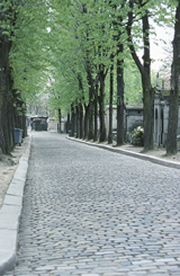 Johnny had left the insurance company's report form at his lodgings in Fulham, so first we drove down there to collect it. (Until we were covered by full insurance we had a month's cover note to make it legal for us to drive the van to an engineer's garage). From Fulham we made our way up Earl's Court Road and along Kensington High Street and Church Street to a point where we turned off towards the Lex garage in Notting Hill. We were just in sight of the latter when there was a loud bang from the rear near wheel and Kelvin, who was driving, quickly pulled over and stopped. We were not sure until we got out whether the noise was a tyre bursting or the engine backfiring. It was the tyre.
Johnny had left the insurance company's report form at his lodgings in Fulham, so first we drove down there to collect it. (Until we were covered by full insurance we had a month's cover note to make it legal for us to drive the van to an engineer's garage). From Fulham we made our way up Earl's Court Road and along Kensington High Street and Church Street to a point where we turned off towards the Lex garage in Notting Hill. We were just in sight of the latter when there was a loud bang from the rear near wheel and Kelvin, who was driving, quickly pulled over and stopped. We were not sure until we got out whether the noise was a tyre bursting or the engine backfiring. It was the tyre.
We thought this might be an opportune moment to buy a jack. So Johnny stayed with the van, Kelvin went to buy a jack and spanner, and Pete and I rolled our spare wheel up the road to the garage to fill it with air. On the partition dividing the rear of the van from the cab was painted: Front 30 lbs, Rear & Spare 35 lbs. The garage air supply was a few yards along from the petrol pumps, and when we arrived with our spare wheel a woman attendant was just refuelling a large Bentley. The air was free, so Pete connected our tyre to the supply and was about to start feeding in air when the Bentley was driven slowly forward and stopped beside us. The woman came too to pump up the Bentley's tyres, but as ours was already connected, she kindly offered to do it for us. We asked her to take it to 35 lbs, and watched as the pressure jumped in small stages from zero to 22lbs. At this point the tyre exploded.
The Bentley owner, thinking she had blown up one of his tyres, leapt from his vehicle muttering oaths about incompetent women. We were left to look sadly at our tyre, now mysteriously leaking copious volumes of water. We thanked the woman for her trouble and rolled the wheel back to the van, which Kelvin and Johnny had now jacked up, removing the offending wheel. In the forlorn hope that the bang had been really a backfire, and the tyre merely had a slow puncture, we rolled that wheel back to the garage and connected it to the air supply, but air came out as fast as it went in.
So we went round to the back of the garage, where we found an Irishman who kindly sold us an inner tube for £1. With this in the wheel, and the wheel back on, we drove at last to the garage. We left the van, and the insurance report form, at the garage over the weekend. By this time, Johnny was becoming rather depressed and said if the report was unfavourable, he would throw in his hand and sell his share to anyone who would buy it.
When we returned on the Monday, the report had been typed, and made dismal reading: "Front tyres 75% worn; back tyres 80% worn; steering ball joint worn out; spares virtually unobtainable." We looked around sadly for our van, and found it parked in an out-of-the-way corner. We got the impression it was not the sort of thing Lex wanted to show to their customers. We climbed aboard, but when Kelvin tried the self-starter, it didn't work. This was particularly annoying, because that had been the one reliable component. Now, however, when we pressed the button, the rotary part of the starter flew forward as it should have done, but on engaging with the dog clutch it was intended to turn, the whole system locked solid. So solid did it lock that a spanner was needed to turn it free again. We tried our starting handle, but that soon burred over as usual. So in the end we got the van going with a push start - fortunately there was a favourable slope.
The bad report and the failure of the starter were the last straw for Johnny, who sought out a friend of ours, Eddie Bell, and sold him his share for £15. Eddie was a good chap to have on the team - he could not only drive, he was in the University air squadron, already able to fly solo, so his ability to handle a vehicle went without saying.
 The Lex report had also said that the back brakes needed adjusting, so that afternoon we jacked the van up and propped its rear end on a pile of bricks. On looking at the brake drums we found that the back brakes weren't working because they weren't connected. With the hand brake fully applied, one could spin each of the rear wheels with one finger. While the back wheels were being turned in this way, another interesting phenomenon came to light. As the wheels turned, the propeller shaft taking the drive from the gearbox to the back axle rose majestically upwards, then fell sharply, once per revolution. As it fell, there was a sickening 'clunk!'. This was the sound Collin and I had heard faintly through the floorboards on the day we bought the van.
The Lex report had also said that the back brakes needed adjusting, so that afternoon we jacked the van up and propped its rear end on a pile of bricks. On looking at the brake drums we found that the back brakes weren't working because they weren't connected. With the hand brake fully applied, one could spin each of the rear wheels with one finger. While the back wheels were being turned in this way, another interesting phenomenon came to light. As the wheels turned, the propeller shaft taking the drive from the gearbox to the back axle rose majestically upwards, then fell sharply, once per revolution. As it fell, there was a sickening 'clunk!'. This was the sound Collin and I had heard faintly through the floorboards on the day we bought the van.
It was now Tuesday, and we were due to go to Cornwall on Saturday. Johnny had already been to the railway station and booked his train ticket. Some quick work was needed if we weren't all going to have to travel the same way.
We traced the peculiar behaviour of the prop shaft to the universal joint between the shaft and the differential on the back axle. An essential part of this joint was a small cross-shaped piece of metal, two arms of which were pivoted to the prop-shaft and two to the pinion drive in the differential. Each arm pivoted in a cylindrical sleeve, or 'bush', and the whole assembly was housed in a sheet-metal cover. It seemed one bush had completely disappeared and the cross-shaped centre piece had worn very badly. This in turn had hammered a hole in the casing, exposing the bearings to any dirt which might be thrown up from the road. Spares being limited, we weren't sure how much we could replace, and with our limited range of tools, we didn't want to damage the prop shaft even more, so we took the whole thing off as a complete unit. This gave us a tube about five feet long to carry around, complete with a universal joint at each end.
On Wednesday morning Collin and I set off with this on our shoulders to go to a nearby garage. They said it could last another five thousand miles, or break at any moment, there was no way of knowing. They gave us the addresses of two good scrap yards, one in Hammersmith and the other in Acton Vale. So we shouldered our prop shaft and caught the bus to Hammersmith. They had a good stock of prop shafts, but none like ours, so we set off again for Acton Vale, this time going by tube. Acton tube station was about a mile from the scrap yard, so we shouldered our prop shaft and walked.....
The second yard belonged to a formidable female of ample proportions in a Fairisle sweater which had seen better days. She was one of the sort who stands no nonsense, least of all from mere men, and had her staff coming and going at the double. She tersely asked what we wanted, and we explained.
"Bert!!" she yelled, and in a trice Bert was there.
"Show these gents the prop shafts, and see if we've anyfink they could use!"
So Bert hastily took us off to a remote part of the scrap yard and showed us a large pile of shafts. Eventually we found one that had the same universals as ours, but it was six inches shorter. We thought we could transfer one of the universals onto our shaft, so decided to take it. We bought it for 30 shillings and took both shafts on the trolley bus from Acton Vale to Kensington. As Collin and I sat side by side on a downstairs seat, each with a prop shaft between our knees, an elderly lady got up from a seat in front of us. As she came back down the bus it turned a corner. Losing her balance, she grabbed onto Collin's prop-shaft, thinking it was a handrail, and was startled to find it wobbled.
While Collin and I were carrying our prop-shafts around West London, Kelvin was looking at the steering, not believing there was any truth in the Lex report that the ball joint was worn out. True, one could turn the steering wheel through a quarter of a revolution without anything happening to the front wheels, but Kelvin was sure that all that was needed was for a few nuts and bolts to be tightened up. He tightened everything in sight to such good effect that the free play in the steering wheel was reduced to a sixteenth of a turn. So that was that problem solved.
On Thursday morning, while Kelvin was running the engine with the bonnet open, he noticed a shower of water flying back over the engine. How often it had done this when the bonnet was closed we didn't know, but we now saw why the radiator needed topping up so often. Most of the water was coming from a hole in the housing of the bearing holding the fan shaft, while more was coming from an inspection plate on the side of the engine. The flow from the first was stopped effectively with chewing-gum, while that from the latter was sealed with a cardboard gasket.
By Thursday lunch-time the transfer of the universal joint was completed with the assistance of staff in the College workshops. After lunch we reinstalled the prop shaft and connected the back brakes. We then drove to a garage north of Bayswater to buy some second-hand tyres. The journey was uneventful up to the point where we were waiting to make a right turn off the Bayswater Road. As we waited for a gap in the traffic, the engine stalled. Eddie and Kelvin were in the cab, while Collin and I were in the back. Kelvin duly descended and went to the front with the crank handle. Normally the self-starter worked, but only when the battery was fully charged, which it wasn't at this moment.
As the teeth on the starting handle started to burr over, so the number of cars queuing up behind us, waiting to turn right, started to grow. The two of us in the back of the van watched the growing queue with increasing apprehension while Kelvin, refusing assistance but with increasing perspiration, valiantly cranked. With one last despairing swing the engine sprang into life. Kelvin jumped in thankfully and, a providential gap appearing in the oncoming traffic, we made our right turn.
At the garage we bought a pair of Dunlop hill-climbing tyres and had them fitted to the rear wheels. Another second-hand tyre went on one of the front wheels, while the best two of our existing tyres went on the other front wheel and the spare. We also bought a couple of spare inner tubes just in case.
Some time before, I had obtained some rubber channelling to fit round the door window frames, and had also ordered some Perspex windows to be cut to a paper pattern I had made. I spent Friday morning fixing these in place. It was not until this late stage that I discovered that the gear teeth on the window winding segments were worn away and the window winders did not work. So the windows had to be raised and lowered by hand. To keep them up required a sharp twist, to jam the lower corner of the Perspex into the rubber guides. This was not ideal, as the windows either promptly fell down again, or jammed shut just when the driver needed to make a hand signal.
Collin, meanwhile, had not been able to provide any kind of tailboard, so we had to do without.
We had five gallons of petrol put into the van on Friday afternoon and decided to start at nine o'clock the following morning. If we left on the Saturday, that still allowed Sunday for us to complete the journey by train, should that prove necessary. Still, we didn't think it would be. Everything was working now, wasn't it?
There was of course no time left to get an engineer's report but our monthly cover note was still valid, allowing us to take it to an engineer for a report. We just hoped it would be considered acceptable if we said we were taking the van to an engineer in Cornwall. It seemed worth a try.
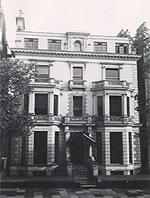 On the night before the Final Year students went to Cornwall, there was, by tradition, a carnival at the College. Kelvin and I popped in for a short while, but Eddie and Collin seemed set to stay all night. It was thus arranged that Eddie and Collin would put their luggage in the van first, as Collin lived at a hostel in the College and Eddie lived nearby. They would then drive up to Holland Park, where Kelvin and I both lived at Number 50, in those days an Imperial College hostel called Selkirk Hall. Photo right: 50, Holland Park, housing the Imperial College Selkirk Hall hostel in the 1950s.
On the night before the Final Year students went to Cornwall, there was, by tradition, a carnival at the College. Kelvin and I popped in for a short while, but Eddie and Collin seemed set to stay all night. It was thus arranged that Eddie and Collin would put their luggage in the van first, as Collin lived at a hostel in the College and Eddie lived nearby. They would then drive up to Holland Park, where Kelvin and I both lived at Number 50, in those days an Imperial College hostel called Selkirk Hall. Photo right: 50, Holland Park, housing the Imperial College Selkirk Hall hostel in the 1950s.
After that, the plan was for Kelvin to drive for the first leg of the journey while Eddie and Collin slept off the effects of the carnival in the back of the van. To save having to sit on bare boards in the back we had equipped it with a camp bed and the seat cushion off the back seat of a bus, borrowed from a fellow student who had in turn "borrowed" it from London Transport.
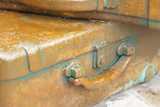 At nine o'clock Kelvin and I were all ready, with bags packed and sandwiches prepared. Eddie had said he wanted an early start and we had no wish to keep him waiting. Ten o'clock came, but still no van. Then, the telephone rang. It was Eddie, ringing from College, to say the van would not start. It had gone all right that morning, he assured us, when he was taking his partner home from the Carnival. This was the first Kelvin and I knew of Eddie's intention to use the van in the small hours, but here he was, telling us happily that it had gone just fine for the fifty mile round trip. On the way, he had picked up a trunk for one of the other students coming to Porthtowan, but now he was stuck.
At nine o'clock Kelvin and I were all ready, with bags packed and sandwiches prepared. Eddie had said he wanted an early start and we had no wish to keep him waiting. Ten o'clock came, but still no van. Then, the telephone rang. It was Eddie, ringing from College, to say the van would not start. It had gone all right that morning, he assured us, when he was taking his partner home from the Carnival. This was the first Kelvin and I knew of Eddie's intention to use the van in the small hours, but here he was, telling us happily that it had gone just fine for the fifty mile round trip. On the way, he had picked up a trunk for one of the other students coming to Porthtowan, but now he was stuck.
Kelvin begged a lift to College from a friend who had a motorbike and, soon after he arrived, the van was successfully started. His friend brought him back on the motorbike, and Kelvin was able to tell me the van would soon be here. Over an hour later, it arrived. The van, it seemed, had stopped twice on the way from South Kensington to Holland Park, little more than a mile, but now it seemed to be going well enough. Kelvin and I loaded our belongings onto it and then Kelvin drove us back to College - it seemed that, with all the problem of getting the van started that morning, Collin had forgotten to put his things on board.
In Cromwell Road the ignition faded and the engine died on us. Kelvin pulled in to the side of the road. Johnny had left us a copy of his circuit diagram, so at least we had something to guide us. Eddie decided that the ignition failure was due to a faulty coil, so he went off to buy one. This proved to have the wrong type of connections, as the one in the van was of an obsolete design. On seeing this, Eddie decided he was too tired to do any more, so he went round to the back of the van and went to sleep on the camp bed. He was dead to the world for 45 minutes, despite the noise of the passing traffic. During this time I traced the whole circuit, but could find no broken wires, blown fuses or bad connections.
I found on the dashboard two ordinary 5-amp switches. One was for the ignition and one switched the dynamo into the circuit. Normally the second switch should only be closed when the engine was running, so that the dynamo could charge the battery. If it were closed when the engine was not running, the battery would discharge through the dynamo and rapidly go flat. In Johnny's hasty departure from the syndicate he hadn't shown any of us the details of his circuit and we hadn't thought to study it. It became clear that we had been running with the second switch open, so losing opportunities to charge the battery.
Suddenly Eddie woke up and shouted through the communicating hole
"Switch the other switch!"
We did so, without really seeing how that would help. Lo and behold, the self-starter worked and the engine ran like a bird. We all jumped in, and drove quickly to College. Evidently the ignition switch was faulty, but the other switch by-passed it.
When we got to College Collin went to fetch his luggage. We noticed we were just in time to have lunch in the dining hall before they stopped serving, so we left the van and all our belongings and went for a meal. As we tucked in we talked over our plans. We had meant to make an early morning start, and it was now early afternoon. Should we head for Cornwall that day? The unanimous decision was yes!
We had, after all, only broken down three times in the last six miles, but that was all behind us now. There was really no good reason to delay any longer.
At two o'clock in the afternoon we set off.
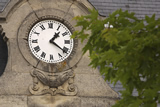 Having had a substantial lunch in the College dining hall and the van now running like a dream, we set off at two o'clock in high spirits. Kelvin was driving and I was navigating with the aid of my old Youth Hostel map, at a scale of sixteen miles to the inch. We began by following the A30, so little map work was called for. We were lucky with the traffic-lights once we got out of Hammersmith, and began to set up a consistent overall average journey speed of 25 miles per hour. Near Bagshot we had another five gallons of petrol put in, and some oil.
Having had a substantial lunch in the College dining hall and the van now running like a dream, we set off at two o'clock in high spirits. Kelvin was driving and I was navigating with the aid of my old Youth Hostel map, at a scale of sixteen miles to the inch. We began by following the A30, so little map work was called for. We were lucky with the traffic-lights once we got out of Hammersmith, and began to set up a consistent overall average journey speed of 25 miles per hour. Near Bagshot we had another five gallons of petrol put in, and some oil.
A short distance beyond Bagshot Kelvin pulled out to overtake a lorry on a clear straight length of road. Just as we were alongside, some traffic showed up in the distance coming the other way. In order to pass the lorry with plenty of room to spare, Kelvin accelerated. It was at this point that we discovered that the van could not be steered at speeds in excess of 45 miler per hour.
Eddie and Collin snoozed peacefully in the back as we zigzagged along on the wrong side of the road to rapidly approaching doom. Kelvin wrestled with the wheel to try to bring us over to the left of the road, while the excessive camber kept pulling us to the right. At last he managed to bring the van onto the crown of the road and we returned, thankfully, to the correct side. All this time I had been watching the wheel jerking this way and that in Kelvin's hands, and thought he was just playing the fool. When I said I didn't think that was the best thing to do while overtaking, he nearly hit the roof! Thereafter we were careful to limit the top speed, but even so managed to maintain the cross-country average of 25 miles an hour.
We by-passed Basingstoke and took the road to Andover. After that we turned onto the A303, which had been recommended to us by Colonel Sheppard, the Professor of Surveying. It was, he said, quieter than the A30. The A303 led us through Amesbury, beyond which we got a good view of Stonehenge, standing mysterious and alone not far from the road. We carried on through Mere and Wincanton to Ilchester, where we stopped for another five gallons of petrol and changed drivers. Kelvin had driven all the way so far, with the sun shining brightly out of a blue sky gradually sinking lower and lower straight ahead of us. His eyes were feeling the strain.
Dusk was rapidly approaching as we left Ilchester with Eddie at the wheel and Collin in the cab as navigator. Kelvin and I lounged in the back on the camp-bed and bus seat, and watched the spasmodic streams of sparks flying out of the exhaust pipe and bouncing along the road behind us.
At the next town, Ilminster, Eddie stopped in the town centre and parked on a sloping piece of roadway so that we could start the engine again by rolling, to save the battery. It was now about eight o'clock and so far we had eaten only a sandwich and an apple each, and Eddie for one was hungry. He refused to go further without a meal of some sort. We still had some food, but there was little chance of us reaching Porthtowan that night and we wanted to keep what we had in reserve.
 We found a chip shop and ate fish and chips, served in the traditional newspaper, on our way back to the van. The engine started well enough and we set off once more. The A303 merged into the A30 once again as we went on our way towards Honiton, heading for Exeter. As we went along it began to rain. Eddie shut his window as well as he could, but thanks to my arrangement it would not stay up with less than a one inch gap at the top. Rain blew in through the gap and saturated Eddie's raincoat. A string of vivid adjectives came floating back through the communicating opening, commenting on the defects in my provision of windows.
We found a chip shop and ate fish and chips, served in the traditional newspaper, on our way back to the van. The engine started well enough and we set off once more. The A303 merged into the A30 once again as we went on our way towards Honiton, heading for Exeter. As we went along it began to rain. Eddie shut his window as well as he could, but thanks to my arrangement it would not stay up with less than a one inch gap at the top. Rain blew in through the gap and saturated Eddie's raincoat. A string of vivid adjectives came floating back through the communicating opening, commenting on the defects in my provision of windows.
When we reached the Exeter by-pass, Eddie could stand it no more. He said he thought it was Kelvin's turn to drive, so we all swapped places, Eddie and Collin in the back, Kelvin and I in the cab. Eddie removed his sodden raincoat and put on his University Air Squadron flying suit, which kept him warm and dry.
We had now had the headlights on for about three hours, and the total electrical load was slightly more than the dynamo was producing. Very gradually, we were running down the battery. After the long day's run, however, we thought it should be pretty well charged, and we were not unduly worried. The first sign that all might not be well was provided by the windscreen-wiper, which stopped working. So that Kelvin could see through the rain-lashed windscreen, I had to reach across and work the wiper from the inside - fortunately its design incorporated a little lever which enabled me to do this. We groped our way along the by-pass, not at all sure of our way. Our only map was at such a scale that it gave no help. Eventually we took a wrong turning onto a road which led into the centre of Exeter. We quickly discovered our mistake, and Kelvin stopped, prior to turning round. As he did so, the engine stalled.
Eddie and Collin climbed out of the back to help me push, cursing at Kelvin for making us get out in the rain. As we pushed downhill the engine started up again, and Kelvin held the van stationary while the three of us climbed back on board. He then started to carry out a three-point turn, intending to return to the by-pass. As he did so, however, a strange thing happened. The gearbox became locked in first gear, while the gear-lever itself was in neutral. Kelvin appealed to Eddie to see if he could free it, but he had no success. This was a nuisance because up to now the only trouble we had had with the gears was that it tended to jump out of third gear as you went along, so the driver had to keep one hand on the gear-lever to hold it in gear when in third.
The engine stalled again, so Kelvin took his foot off the clutch and let Eddie have the driving seat once more. The rest of us pushed and pulled the van around until it was once again facing into Exeter, then gave it another push-start. Eddie sat with his foot on the clutch while we all piled in, this time with Kelvin and Collin in the back and I in front. We then drove into Exeter in search of a garage.
It was now about nine o'clock and the first garage we saw was well and truly closed. However, in the hope that someone lived on the premises, three of us got out while Eddie sat with his foot on the clutch. But there was no-one about. As I got in again, with Eddie impatient to be off, I noticed something loose. It was the catch on the doorpost, another of the items I had had to replace in recent weeks. The catches I had fitted were held in place by long screws which only just reached the wooden part of the van body behind the doorpost. Obviously the screws in this catch had come loose, with the risk that the catch might be lost. However, with the door shut, the door held the catch in place, so all seemed well.
At the second garage we came to there was no sign of life either, but again we got out to check, just to make sure. It must have been here that the door catch fell off, but in the darkness I didn't see it go. It wasn't until we were on the move once more, and my door flew open, that I realised the catch had gone. There was no going back for it, because we could only go forward in first gear. So, from then on, I had to hold the door shut with my left hand while I worked the windscreen wiper with my right.
Finally, much to our relief, we saw in the distance across a dark unlit waste area - obviously an old bomb site - a large neon sign proclaiming ALL NIGHT GARAGE. We joyfully headed for this but, in his eagerness to get there and confused in the rain by the darkness as to the lie of the roads, Eddie took a wrong turning. We proved to be on the road which ran parallel to the one the garage was on. Eddie stopped the van and sat with his foot on the clutch once more while the three of us piled out and pushed the van backwards towards the turning we should have taken. It was at this point that the policeman arrived.
"What's all this yer?" he enquired.
"We are just going back round that corner," we explained.
"Well, why don't 'e drive un?", he asked, more than a little puzzled. "You'm got a reverse, aint 'e?"
"Ah! That's just the trouble," we told him. "The gearbox is stuck in first gear and we are trying to get to the garage there, round the corner, only we took the wrong turning."
He looked pensive, as if he thought we were pulling his leg, then kindly bent to help us push.
Once we had passed the side road we wanted, the policeman nodded and plodded off into the rain, which had now eased to a drizzle. Eddie drove up the road and into the garage, switching off the engine at last. The attendant was serving another car with petrol but when he had finished he came over to us.
"We are having some gearbox trouble," we explained, "could he help?"
"Sorry," he said, "I'm only the pump attendant. There won't be no fitters here till nine o'clock on Monday."
"Well, said Eddie, "we can't wait that long! I'll just show you what the trouble is and perhaps you would have an idea what we could do about it."
So saying, he jumped into the cab and put his hand on the gear-lever to show how it was unmovable. He pushed it forward, and it went forward. He pulled it back, and it came back. He tried it in all four forward gears and reverse, and it went into them all. He left the gear in reverse while we gave the van another push start. Then we all jumped aboard and drove off into the night, leaving the pump attendant open mouthed. If we had thought, we should have bought some petrol from him.
Some way out of town, Eddie handed over the driving to Kelvin once again, with strict instructions not to jam the gear-lever.
The rain intensified once more as we set off for Okehampton. As we sped along the dark deserted road with me operating the windscreen wiper and holding the door shut, it seemed more than likely that we wouldn't find another garage open. The failure to top up with petrol in Exeter became a matter for concern.
In Okehampton we took another wrong turn. We should have turned left to follow the main road, but instead found ourselves going up a steep narrow road, much too steep and much too narrow to be the main road. Looking at the map we thought we could see which road we were on, so we went left at every opportunity and in due course came to a main road. If our interpretation of the map was correct, this was a road running north out of Okehampton, so we turned left, thinking to go back into town to try to find the A30.
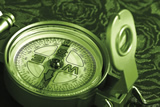 As we went further, the suspicion grew that we were already on the A30, going in the wrong direction. The first signpost we saw through the driving rain confirmed this view - we were travelling east, not west. So Kelvin turned the van around once again, taking great care with the gearbox. The manoeuvres woke Eddie, who made suitably acid comments from the back.
As we went further, the suspicion grew that we were already on the A30, going in the wrong direction. The first signpost we saw through the driving rain confirmed this view - we were travelling east, not west. So Kelvin turned the van around once again, taking great care with the gearbox. The manoeuvres woke Eddie, who made suitably acid comments from the back.
We had seen no open garages in Okehampton and this made us doubt if we would find any in Launceston. Without more petrol, it was doubtful if we would get across the wilds of Bodmin Moor. Our roundabout exit from Okehampton, including the climb up the steep hill, had done nothing to help the petrol situation. Still, we could but hope for another late-night garage.
We made steady progress through the rain until we came to the hill leading into Launceston. No sooner had we started to climb this hill than the engine died away, powerless. We pulled to the side of the road and all got out to investigate. Fortunately by now the heavy rain had eased to a drizzle once more. It was definitely damp, but not too wetting. It was now 12.30 a.m. in the early hours of Sunday morning.
From Johnny's circuit diagram it was evident that the horn and the ignition were both run off the same fuse. Collin tried the horn and it still worked, so the fuse seemed to be all right. We had no torch, so we unbolted the rear-view mirror and held it in front of a sidelight so that it reflected some light under the bonnet. The illumination we had from this was very poor to work by, but better than nothing. After a while we thought things looked promising and, on rolling the van downhill in reverse there were signs that the engine would start.
Leading off the main road near the bottom of the hill was a track to a gate which opened into a field. This track ran alongside the road for some way and was at a less steep gradient, so that for some way there was a stone wall flanking the main road, supporting the track. While rolling backwards down the road we first got too far into the middle and then, in our efforts to correct this, came too far into the side and wedged into the stone wall. The main road was fairly steep, at a gradient perhaps of one in twenty, but there was nothing for it now but to push the van uphill to get away from the wall. With much heaving and straining we managed this and were soon rolling the van downhill again. Just before we reached the bottom, the engine sprang to life.
We all piled in once more, and had a pleasant ride up the road until we had just entered Launceston, at which point the engine stopped again. By now the gradient was less steep and there were houses alongside the road. We tried checking the circuit all over again with little success. Collin got it into his head that we could test all kinds of things simply by pressing the horn. Time and again we told him not to do it, yet every couple of minutes or so he sounded the horn. We felt very guilty when we heard a baby start to cry and decided there and then to abandon attempts to continue our journey.
We rolled the van all the way back down the hill until we came to the branch track we had seen, pushed the van on to it and parked. We were off the road, out of the way of any traffic although, truth to tell, no other vehicle had come that way in the hour we had spent fiddling. We switched off the lights and settled down. Collin took the cab, Eddie the bus seat, while Kelvin and I shared the camp bed. This didn't give us much room, but we managed to fit by lying back to back. Soon we were all fast asleep, exhausted.
The three of us in the back suddenly shot awake when Collin banged his fist loudly on the wooden partition and shouted through the hatch
"How do I get out of here?"
Being drowsy, we had no idea what he meant.
"Try the door handle", I told him.
"Good idea. Never thought of that!" he answered, and lapsed into silence.
It later transpired that, though he had woken all three of us in the back, throughout all this Collin himself was fast asleep. Next day, all he could recall was a bad dream when he had been in some kind of trap. He had, it seemed, had one leg wedged between the gear-lever and the hand brake.
After this disturbance, Eddie in his flying suit quickly got to sleep again, but Kelvin and I, wedged together on the camp bed, found further sleep elusive. The rain came on more heavily, and started to blow in on our feet. In the early days it had been suggested to Collin that, in addition to a tailboard, he rig up a curtain to cover the back of the van. But he hadn't made a tailboard, he hadn't rigged a curtain, and he hadn't got around to painting the canvas roof with waterproofing dope. But then, he wasn't sleeping in the back of the van. Now, thanks to him, neither were we.
As we had the roomiest vehicle going to Cornwall that year, several people had asked us to carry various articles for them. Cold rain on one's feet is not the best thing for inducing sleep, so I felt around in the dark for something to cover them with. I soon found a piece of thick material which felt just the thing. Kelvin and I wrapped it around our wet and muddy shoes and let it take the force out of the driving rain. By daylight next morning we discovered it was somebody's expensive College blazer.
The blazer soon became a damp and sodden rag and our feet as cold as ever. In an attempt to stop any more rain falling on my feet I moved up the bed, so my feet were about a yard from the bottom while my head overhung the top - not very comfortable. However, I found a kitbag to rest my head on and that might not have been so bad, had it not been for the drip.
The van was parked beneath a tree and as the rain persisted, heavy drops of water landed splat on the canvas roof - the roof Collin hadn't waterproofed. Before long the drips came straight through. As I lay on my right side wedged between suitcases and kitbags, my right forearm was sticking up in front of my face. A steady drip found its way into the open end of my sleeve, and trickled down to the elbow. I moved to avoid this, and another drip found my left ear. I eventually found an acceptable position in which the drops landed on my left cheek, trickled past my eye, and dripped off the end of my nose.
Kelvin was having much the same trouble and of course when either of us moved, he disturbed the other. It might not have been so bad had the rain been warm, but in the early hours of March 16 it was decidedly chilly. Suddenly, I remembered that, somewhere in the van, I had a brand new raincoat wrapped in a brown paper parcel. We felt around for it and tore open the parcel feverishly. It was too late to keep us dry, but at least it prevented us from getting any wetter. Eddie's flying suit seemed to be keeping him warm enough, for as far as we could tell he was sound asleep, rain or no rain.
One consoling thought was that although we hadn't reached Porthtowan, we had reached Cornwall. We had always said we would. Launceston was about one mile inside the county, so we had just made it.
At a quarter past six Kelvin and I woke from the light doze into which we had fallen, and discovered that it had stopped raining. It was also beginning to get light, so we tried to get warm by walking into Launceston. Our idea was to find a garage which would open later in the day, where we could have our battery recharged. We had decided that a flat battery was the cause of our breakdown. We woke Eddie and Collin before setting off, and left Collin re-examining the electrical circuit all over again. Eddie said it was pointless to bother, and went to sleep again.
Kelvin and I walked round the centre of Launceston noting where the garages were, and also the railway station in case we should need it. We met one solitary man on our tour, who told us that one of the garages would open at eight o'clock. We decided to take the battery there, and set off down the hill to where we had left the others. As we passed the house where we had woken the baby in the night, we could see down the road to the little side track where the van had stood. It was empty. The van had gone.
This was disconcerting, to say the least. Where had they gone? How had they managed to get the van going? The questions were endless. As we stood rooted to the spot in bewilderment, we became aware of a vehicle horn hooting behind us. Turning round, we saw a Landrover, with Collin climbing out of it. After our sleepless night, I wondered if I was hallucinating. Had our van undergone some magic transformation?
The truth began to dawn when I saw the driver of the Landrover. It was Hamish Alexander. Hamish had first gone to the School of Mines in 1940, then had to break off because of the war, but had returned in 1944 and completed the course in 1947. While at the College the second time he had lived in the Holland Park hostel where Kelvin and I now were, and whenever he was in London he made a point of coming to see the warden, Colonel Lowry, and his wife. After graduating, Hamish had gone first to work at a mine in Spain, then had joined the College staff for a while. So, one way or another, Kelvin and I had met him on a number of occasions. Now, in 1952, he was employed on a tunnelling contract for one of the Scottish hydro-electric schemes. The firm's head office was in London, and Hamish came down periodically to attend meetings.
Hamish always tried to time one of his London visits to coincide with some School of Mines event, such as the annual rugby match against Camborne School of Mines or, as on this occasion, the Carnival. He had driven down from the Highlands over night on Thursday and, as luck would have it, he had decided not to travel in his own small car, but had elected to come in the company's Landrover.
After a few drinks chatting to acquaintances in the bar, he had decided to make a weekend of it, and thought it would be a good thing to go back to Scotland by way of Cornwall. He knew the students would be travelling down in assorted ancient vehicles, and vaguely thought his Landrover might come in useful. He had invited two friends to come too, and after having a short sleep during Saturday they had set out in the evening for an overnight drive. The intention was to spend Sunday in Cornwall, drive back to London on the Sunday night, then Hamish would go to Glasgow on the Monday morning. He obviously liked driving!
The two friends Hamish had with him were Bill Robinson and Derek Crossley, both of whom had seen our van parked behind the College with all the other vehicles. When they saw it beside the road at about seven o'clock on the Sunday morning they had immediately recognised it and pulled up to ask if there was anything wrong, or were Collin and Eddie just resting? It seemed little short of a miracle that the very first vehicle to come that way since we had broken down was a Landrover whose driver was making a slight detour on his way to Scotland.
Kelvin and I climbed with Collin into the back of the Landrover. As we went with ease up the hill which had proved such an obstacle the previous night, we heard how Hamish had a steel tow rope with him, and they had taken the van further on to where it was parked on the by-pass. When we reached the van, we found Bill, Derek and Eddie trying once more to start the engine. The tow rope was tied on again and an attempt made to start us with a tow. But our battery was completely flat, the dynamo seemed useless, and the engine remained lifeless. Hamish considered the situation, and said the only thing for it was a tow all the way to Porthtowan: a mere sixty miles.
Eddie, the pilot, was chosen to take the controls of the van, as quick reactions were going to be needed. Hamish and Eddie discussed procedure. It appeared that our brakes were not functioning well - indeed, it seemed that the back ones might have become disconnected again. The two drivers agreed that on downward grades our engine was to be put into gear so that its compression would help retard our progress. Hamish would approach the tops of declines slowly, then keep a look out in the rear view mirror, and speed up if he thought we were about to crash into the back of him.
To begin with the steel tow rope, which was about half an inch thick, was about twenty feet long, and there was plenty of space between the vehicles. We checked the knots, and set off. We went sedately out of Launceston, but on the open road across Bodmin Moor Hamish stepped on the gas. The rain had ceased at dawn, but the road surfaces were still wet. Kelvin and I sat white-faced in the back of the van, staring at our tyre tracks, wandering crazily all over the road. We had forgotten to tell Hamish that the van was unsteerable at speeds above 45 miles an hour, and Eddie needed all of his quick reactions to hold us on the road. We were touching 55 miles an hour over most of the moor, and at times it seemed it was only the pull of the tow rope that kept us on the road. We hit the verges on both sides a number of times. Half way over the Moor, some small metallic object fell off the van and bounced along, pinging, behind us. Whatever it was remained a mystery. It couldn't have been important, because we never missed it.
A short while later the tow rope parted. Hamish stopped and reversed to where we were. While we tied a knot in the rope, Eddie took the opportunity to tell Hamish about the problem with the steering, a point which Hamish noted. We started the descent from Bodmin Moor at a sedate five miles an hour but, despite the resistance of having our engine in gear, we started to catch him up. Hamish speeded up a bit to keep ahead of us, and by small increments our speed gradually increased. We probably passed through Bodmin at over forty miles an hour but, sitting in the back of the van, I could only guess at our speed.
From then on the tow was fairly straightforward, the rope only breaking seven or eight times. As we were tying one of the many knots in the rope an AA breakdown man came along on his motorcycle. I don't think he had ever seen anything like the spectacle we presented, and he followed us for miles. I think he was waiting to see where we crashed, so he could warn AA members of the obstruction. He looked on in disbelief when we got to the end of his patch and were still making progress.
In addition to not telling Hamish about the steering problem, we had also omitted to tell him where we were going. Somehow, we assumed he would know we were heading for the Mine Surveying Course at Porthtowan. During one of our stops to retie the tow rope, Hamish walked round to the back of the van, studying it pensively. No sooner had we got going again than we passed a signpost pointing to Porthtowan. Nearly there! The only trouble was, Hamish had taken the other road!
At first we thought he must know a better route, so we took no action. When he passed a second Porthtowan signpost, however, we began to get worried. Where was he taking us? The battery being flat, we could not sound the horn. So we waved our arms out of the cab windows and all yelled in unison. That caught his attention, and he stopped. It seemed he had thought we were going to Camborne, to a rock drilling course run by the equipment manufacturers Holman Brothers, but we had all been on that the previous year. It transpired that his deep study of the back of our van was because he didn't want to repeat the Bodmin experience as we went down the steep hill into Camborne and was thinking of tying the rope to the back of the van while we rolled down in front of the Landrover. I doubt if even Camborne policemen, used to student pranks, would have turned a blind eye to that one.
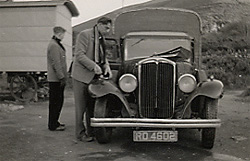 Once Hamish knew where we were going, he took the next available turning, and we reached Porthtowan at nine o'clock. We left the vehicles on the road leading to the beach, and climbed up to the hotel, which stood on one of the cliffs overlooking the bay. Photo: The van parked at Porthtowan as Kelvin Baird (furthest from the camera) and Brian Collinson contemplate how to get back to Kensington!
Once Hamish knew where we were going, he took the next available turning, and we reached Porthtowan at nine o'clock. We left the vehicles on the road leading to the beach, and climbed up to the hotel, which stood on one of the cliffs overlooking the bay. Photo: The van parked at Porthtowan as Kelvin Baird (furthest from the camera) and Brian Collinson contemplate how to get back to Kensington!
Johnny, who was still in our survey group, had travelled down by train the previous day and warned the hotel keeper not to expect us at least until Sunday. He had just finished an enjoyable breakfast and was amused to see us turn up looking like so many tramps. He was most indignant when we told him it was his electrical system which had let us down. He considered that a personal slight. He seized a screwdriver and stalked out saying he would drive it up to the hotel within ten minutes. We knew that with a flat battery he hadn't a hope but were in no mood to save him the walk down the hill.
While he was gone, the rest of us settled down to hearty breakfast of bacon and eggs, after which we sauntered down to see how Johnny was getting on. As we expected, he hadn't managed to start the van. At that point Hamish and his friends went on their way, with heartfelt thanks from those of us they had helped out in such a magnificent manner. Who would have thought of a sixty mile tow?
To give Johnny his due, he pinpointed the trouble before lunchtime. It was the horn button which was to blame. Johnny now remembered that he had noticed a problem with this before he had sold his share in the van, but had forgotten about it in the welter of other problems. A steady leakage current flowed through the button, and if you put your ear directly on the horn, you could hear a slight buzz. It was not loud enough to be audible against the background noise you get in London, or on a quiet country road when it is pouring with rain, but it was there. Given time, it was enough to run the battery flat, and that is what it had done.
Eddie took his things and went to join his survey team mates in a boarding house elsewhere in Porthtowan. The rest of us unpacked our things from the van, settled into the hotel and each had a much-needed bath.
The hotel keeper had a little van himself, which he used to fetch supplies from Redruth. As one of the ancillary bits of equipment he had to help him run it was a battery charger. We borrowed the use of this, and left our battery on charge for several days. The van was parked out in the open by the beach so that we should not have to carry the battery too far when it was ready. Once it was fully charged we put it in the van, which ran perfectly again. Johnny had solved the problem of the leaking horn button quite simply by disconnecting it. We had no horn to use, but that seemed a minor problem. The hotelier kindly let us put the van in a garage he owned, in the valley some way from the hotel, close to a number of bungalows. He usually parked his own van up near the hotel.
The survey course stared on Monday, and we were kept very busy for most of the hours of daylight, with reports and calculations to do in the evenings. However, we did find some time to tinker with the van, the first priority on which was to fix the brakes once more, although the self-starter continued to be unreliable.
On our first Saturday in Porthtowan, Johnny and Collin decided to use the van to go to a dance in Camborne. It went all right, and as a precaution they parked it on a piece of sloping ground, to be ready for a push start. At the dance they picked their partners with care. The main criteria they used in choosing the partners were that the girls should accept offers of a lift home after the dance and also be hefty enough to give a useful shove when the time came to push the van.
Johnny and Collin found two girls who satisfied these requirements, and had a happy and relaxing evening. After the dance, the girls duly helped to push, but the van reached the bottom of the incline before the engine started. However, Johnny and Collin had chosen well and they were strong girls, so they helped push the van all the way back up the hill. On the second roll down, it started. They all got in and drove out into Camborne High Street, a road where the police were notorious for picking on any unroadworthy vehicle. There, the van stopped.
They were just in the middle of rolling it backwards down the road when a policemen came along. He said it wasn't the right thing to do in the main street, and helped them to push. This proved to be no good, so he asked them if they were sure they had enough petrol. As there was no petrol gauge on the dashboard, this was a matter for conjecture, until the day we discovered the dipstick under the floorboards in the back. Luckily, Johnny had bought some petrol, which he had in two old cider bottles. He took up the floorboard and emptied these into the tank. The gang were all ready to push again, when the policeman said no, start it where it is.
To give Collin the chance to concentrate, Johnny placed a brick which we carried for the purpose under the back wheel, and went to the front to crank the engine. Fortunately, it sprang into life quickly and Collin was able to drive off. He did not dare to stop again in sight of the policeman, being in the cab on his own yet still having only his provisional licence, so he carried on round the next corner. He was having an interesting time, with his right foot on the accelerator, his right hand on the wheel, his left knee holding the gear lever in third gear and his left hand holding the nearside door shut.
Johnny surreptitiously picked up the brick, thanked the constable for his help, and accompanied the two girls up the road. As they came to the place where Collin had parked, one of the girls said she was nearly home and could walk the rest. So Johnny gave the brick to the second girl to carry and walked the first girl home. As he returned to the van he was worried to hear the engine running at full throttle. What was the matter now? When he came up to the van, however, the reason was clear. Collin and the girl were in a tight embrace, so absorbed in each other that Collin was unaware his foot hard was hard down on the accelerator.
The month's cover note insurance expired, and we were all kept busy with the surveying, so the van was not used very much during our weeks in Cornwall. One planned trip proved abortive when the engine stalled yet again, just in front of the one garage in Porthtowan. We were counting on the owner of this garage to give us a cover note for our return journey, so to break down in front of him was rather embarrassing. The problem this time proved to be thanks to the owner of a bungalow near the garage where we housed the van. Disgruntled, perhaps, with our frequent fiddling with it just outside his home, we discovered the petrol tank had been filled with dirty water from a washing-up bowl. We never found out who the culprit was.
The water siphoned out and the tank refilled with petrol, we took the van to the Porthtowan man for his engineer's report, needed for our insurance. He took one look at it.
"Does it go?" he asked.
We assured him that it did.
He jumped aboard, turned the key in the ignition and, wonder of wonders, the engine sprang to life. He hastily selected a gear and let in the clutch. The van leapt sharply backwards, as he had put it in reverse. He slammed the brake on quickly to avoid demolishing his one and only petrol pump, and jumped out, looking embarrassed.
"That's fine!" he said, and signed our piece of paper.
The journey back to College at the end of the survey course was absolutely uneventful and we parked the van round at the back of the College, as before. As the time came for us to leave, the problem arose of what to do with the van, but this seemed to be solved when Collin said he would be coming back to do a postgraduate year, as he was captain of the College soccer team, and wanted another season of football.
We all went our various ways. Eddie went to a mine in Mexico, where he married the manager's daughter and became a true Mexican; Kelvin, who had been at the College on a Coal Board scholarship, went to a coal mine in Fife; I elected to do my National Service and joined the Royal Engineers, being posted eventually to the Tunnelling Troop in Gibraltar; and Collin went for vacation work at a copper mine in what was then Northern Rhodesia. From there, he wrote to Kelvin and said he was planning to marry the manager's daughter, and would not be coming back to England. He sent Kelvin the van's log book.
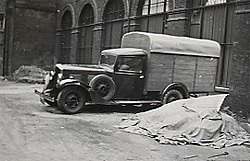 So there were none of us around to deal with the sale of the van. Kelvin did what he could, trying to persuade the new final year students to take it, but he had no luck. Eventually, the College authorities got awkward. The Imperial Institute was moving to another site, they wrote, and the existing building, beside which our van was parked, was to be demolished. New buildings were required for Imperial College on that site, and our van was in the way.
So there were none of us around to deal with the sale of the van. Kelvin did what he could, trying to persuade the new final year students to take it, but he had no luck. Eventually, the College authorities got awkward. The Imperial Institute was moving to another site, they wrote, and the existing building, beside which our van was parked, was to be demolished. New buildings were required for Imperial College on that site, and our van was in the way.
Photo above right: The van parked behind the City and Guilds delaying the planned expansion of Imperial College!
With Kelvin in Fife, Collin in Rhodesia, Eddie in Mexico and me in Gibraltar, there was not a lot we could do. Eventually the College lost patience, and Kelvin received a message to say they had cut up the van with an acetylene blow-torch. So in the end, like the brothers who sold it to us had said, it went for firewood.
The geology field trip, 1950
I started the mining degree course at the Royal School of Mines in the autumn of 1949, straight from school. It was not long since World War II had ended, and about half our year were ex-servicemen, so we were quite mixed in ages. Some, like myself, were just eighteen, while the eldest in our year was in his thirties.
Some of the studies in that first half year, like Statistics and Applied Mechanics (the efficiencies of levers and pulley systems) seemed deadly dull. However, the topics for the second half-year, starting in February, were far more interesting. These included the Principles of Geology and how to identify different rocks and minerals. The Professor of Geology was H. H. Read, a great character. He was famous (or should it be notorious?) for having proposed a controversial theory upon the formation of granite, based on years of study of the rocks in the Scottish highlands. He strongly recommended that we should each buy a copy of Rutley's Mineralogy, (24th edition, revised by H. H. Read), if for no other reason, he said, than that he received sixpence for every copy sold. (I did as I was told and bought a copy. It is the only textbook from all those years ago which I still find useful, and is assured of a place on my bookshelf).
The liveliest lectures were those by Mr. Carter on Palaeontology, the study of fossils. Quite a dashing young chap, with a Distinguished Flying Cross to his name, he clearly envisaged all these creatures which had died millions of years ago as alive and well and crawling about all over the place. His enthusiasm was quite infectious. The only dull lectures in geology were those given by Dr. Jones, whose special topic was crystallography. We had to look at large cardboard models of mineral crystals and see if we could tell him which of its faces had the Miller symbol (0, 1, -1, 0) and which were the clinopinacoids, and weird names like that.
A key part of the Geology course was the Field Trip during the Easter vacation, when different groups of us went off to various locations in the U.K., each group being led by one of the lecturers. Much to our dismay the group I was in, about ten of us, was to be led by Dr. Jones.
To go on the trip we travelled from Paddington to Gloucester, then took the branch line out to Newent. The local train, consisting of just two carriages, was pulled by a busily-puffing little tank engine travelling in reverse, with its front end coupled to the leading carriage. It was a bright sunny day and as we looked out of the carriage window at the pleasant countryside, the shadow of the train showed clearly in the grassy fields beside the track.
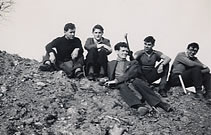 We were going to study the geology of May Hill in Gloucestershire. Dr. Jones had made a block booking for all of us at The George Hotel in the centre of Newent. This was a few miles north of May Hill, so we had a tidy walk to and from the study area each day, but we found there were two good reasons for this. Firstly, The George was the nearest hotel big enough to accommodate us all. Secondly, and far more importantly in the eyes of Dr. Jones, The George did a good line in draft cider. Good rough cider, at six (old) pence a pint, was readily affordable by any impecunious student. This showed an altogether different side to Dr. Jones's character. He wasn't such a boring chap after all! Photo above: Mining students on the geology field trip to May Hill, 1950. From left to right: Pete Young, Kelvin Baird, Gordon Tait, Brian Collinson, Tony Brewis.
We were going to study the geology of May Hill in Gloucestershire. Dr. Jones had made a block booking for all of us at The George Hotel in the centre of Newent. This was a few miles north of May Hill, so we had a tidy walk to and from the study area each day, but we found there were two good reasons for this. Firstly, The George was the nearest hotel big enough to accommodate us all. Secondly, and far more importantly in the eyes of Dr. Jones, The George did a good line in draft cider. Good rough cider, at six (old) pence a pint, was readily affordable by any impecunious student. This showed an altogether different side to Dr. Jones's character. He wasn't such a boring chap after all! Photo above: Mining students on the geology field trip to May Hill, 1950. From left to right: Pete Young, Kelvin Baird, Gordon Tait, Brian Collinson, Tony Brewis.
On the first day in the field we covered about twenty miles, walking together as a group over May Hill from north to south. We covered the same distance again the next day, traversing it from east to west. After that, the group split into pairs, each studying a small area, then sharing our information with the other groups. We had bought six-inch-to-the-mile Ordnance Survey maps of the May Hill area from Stamfords of Long Acre, and used these to find our way around.
In the evenings Dr. Jones would give each pair detailed instructions for the following day. It soon became apparent where his priorities lay.
"There are some excellent fossils to be found in that old quarry," he would tell us, pointing it out on the map, "but don't waste too much time there. They do a very good cider in that farmhouse nearby, so be sure to leave plenty of time for lunch!"
In the ten days we were in Gloucestershire, we learned quite a bit about the geology of May Hill, an inlier of ancient rock surrounded by concentric rings of newer rocks, but we also acquired a healthy taste for a wide range of home-brewed ciders of the highest quality. Some of it was powerful stuff. One day after lunch Kelvin had to restrain his partner, Mike O'Connor, from digging a lump out of the tarmac on the main road, so convinced was he that it was a rock sample worth taking.
 One evening Kelvin and I played a game of billiards in the back room at The George. The combination of the bright lights over the billiard table and two pints of local cider gave me a sort of tunnel vision. In my field of view there was this narrow circle where everything looked brilliantly clear and of intense colour, surrounded by a zone of total blackness. I had to hang on to the table to steady myself as I walked around it. In one of his shots, Kelvin potted my ball, then left the red and his white both in balk. I sized up the situation, placed my ball within the D, and focused as never before on the tip of my cue. I struck the ball, and it sailed up the table. After bouncing off three cushions it hit the red and potted it in the bottom left-hand corner pocket. It hit the bottom cushion, then cannoned into his white ball and hit it into the bottom right-hand corner pocket. After that, my ball bounced off the side cushion and went neatly in-off in the top left-hand corner pocket. Having been left a double-balk, I had scored ten points, the maximum possible with a single shot in billiards. It is clearly excellent, that Gloucestershire cider.
One evening Kelvin and I played a game of billiards in the back room at The George. The combination of the bright lights over the billiard table and two pints of local cider gave me a sort of tunnel vision. In my field of view there was this narrow circle where everything looked brilliantly clear and of intense colour, surrounded by a zone of total blackness. I had to hang on to the table to steady myself as I walked around it. In one of his shots, Kelvin potted my ball, then left the red and his white both in balk. I sized up the situation, placed my ball within the D, and focused as never before on the tip of my cue. I struck the ball, and it sailed up the table. After bouncing off three cushions it hit the red and potted it in the bottom left-hand corner pocket. It hit the bottom cushion, then cannoned into his white ball and hit it into the bottom right-hand corner pocket. After that, my ball bounced off the side cushion and went neatly in-off in the top left-hand corner pocket. Having been left a double-balk, I had scored ten points, the maximum possible with a single shot in billiards. It is clearly excellent, that Gloucestershire cider.
One day towards the end of our trip we went over to visit another group who were studying the Mendips. We found them very disgruntled. Much to their dismay, their lecturer had proved to be a tee-totaller, and for the ten-day trip he had booked them in to an isolated temperance hotel, with not a single pub anywhere within walking distance.
There was, of course, a serious side to the Field Trip, and I subsequently wrote a 5,000 word report, complete with maps, sections, photographs and a water-colour sketch showing how the vegetation on May Hill varies according to the different types of underlying rock.
A matter of rank
Colonel Jack Sheppard was proud of the fact that he and some of his staff had prepared the maps of France used by the Allies for the D-Day landings. After graduating himself from the Royal School of Mines in 1936 and working for a while at the Cam and Motor mine in what was then Southern Rhodesia, he had returned to the RSM in 1938 as a lecturer in surveying. The war intervened, and from 1939 until 1945 he served in the survey section of the Royal Engineers. The story in circulation during the early 1950s was that, when invited back to Imperial College to take the post of Reader in Mine Surveying, he said he would come “provided I can bring my own staff.”
So it was that, working with him, he had as a lecturer Captain Thomas Llewellyn Thomas, who had been his leading mathematician-calculator, and, as Drawing Office Assistant, Staff Sergeant Ben Parker, an accomplished artist who guided us in the use of watercolours for painting our maps.
I did my mining course from 1949 to 1952. Almost half my year group had done military service, even if only National Service after the war. The year ahead of us, however, had an even greater proportion of people who had seen active service for much of the time of conflict. One of these was David Storrs.
The story was told of how, in the drawing office one day in the summer of 1951, David had been in conversation with Colonel Sheppard and happened to refer to ‘Mr.’ Thomas. Colonel Sheppard drew himself up to his full five-feet, four-inches height and snapped:
"Kindly refer to members of my staff by their appropriate rank. It is Captain Thomas, if you please!"
David Storrs snapped to attention and said:
"Certainly, Sir! Kindly ask him to refer to me by my appropriate rank. It is Major Storrs, if you please!"
From that day on, Captain Thomas Thomas was always referred to officially as plain Mr. Thomas. Unofficially, bearing in mind that he was a mathematician, and that in algebra t x t = t2, we often called him Thomas Squared.
H. H. Read's talk of his trip to the United States of America
Although a mining student, I was particularly interested in geology, so I joined the De La Beche Society, which met from time to time to hear informal talks with a geological theme. One talk which I remember well was given by Professor H.H. Read, in which he told us about a visit he had just made to places of geological interest in the United States of America.
At one point, he told us, he was in Texas as a guest of the Geological Society of one of the main cities in that state, and one evening they held a dinner in his honour. A fellow guest was the president of the geological society in one of the other cities, and Prof Read had quickly discovered that the two societies were, for some reason, deadly rivals. Nevertheless, while Prof Read was the one who had to give the main speech after the dinner, it fell to the other man to respond to the toast for the guests.
“It gives me great pleasure to be here tonight”, he began, in a slow Texan drawl, “in such a unique city”. There was a moment of shocked silence at this amazing admission of their city’s status, followed by a rapturous round of applause. The speaker then continued “And we all know the derivation of the word ‘unique’. It comes from the Lat’n: ‘unus’, one, ‘equus’, horse”. Another shocked silence, then pandemonium broke out. He had nothing else to say, so sat down.
Later, Professor Read told us, he was in some town in the far west. “It was the sort of place”, he explained, “where they would saddle a horse to ride down the street to post a letter”. The local geological feature of interest was a famous natural rock arch of impressive span, located about eleven miles out of town. To see it, the local geological society had turned out for the day in honour of their guest and had, of course, provided him with a horse. “The type of saddle they use there has a high post in front, for you to store your lasso,” he told us, “and with my figure I found that most uncomfortable”. (He was a fairly stout gentleman, and we could quite see why he said this). “As you will know, walking some distance is no problem to me”. He was, after all, famous for his studies of the rocks of the Scottish Highlands, and had the reputation of covering many miles in a day. “After one mile”, he told us, “I just couldn’t stand the discomfort any more, so I dismounted. I couldn’t disrupt the trip by asking for the horse to be taken back to town, so I proceeded to walk, leading my horse”. So on they went, ten miles there, and eleven miles back, with Professor Read walking ahead of his horse, leading it by the reins all the way.
“The town,” he told us, “was in a part of the country where alcohol consumption was limited. Each person had a monthly ration, his bottle being kept behind the counter in the local bar, and doled out little by little during the course of the month. That night, however, everyone finished his entire month’s ration. They just could not believe that anyone should walk twenty-one miles leading a horse”.
© 2007 Imperial College London
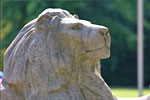
Through the first decade of the twenty-first century the campaign seeks to philanthropically raise £207 million from Imperial’s alumni, staff and friends, and donations from charitable foundations and industry.
Where your support can make a differenceGive now

Imperial’s Centenary Year provides an opportunity to recognise and celebrate members of the Imperial community.
View staff and student portraits